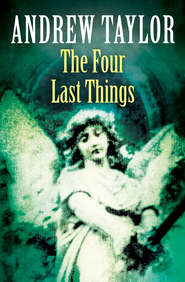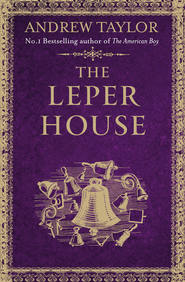По всем вопросам обращайтесь на: info@litportal.ru
(©) 2003-2024.
✖
Richard and Judy Bookclub - 3 Bestsellers in 1: The American Boy, The Savage Garden, The Righteous Men
Автор
Год написания книги
2018
Настройки чтения
Размер шрифта
Высота строк
Поля
“I do not know.” I looked into her face. “Can you not ask him yourself?”
She shook her head. “I scarcely know him. We were introduced, but he has no conversation. Anyway, why should he wish to waste his time talking nonsense to a chit of a girl?”
I made no reply, for none was needed, or not in words. The question hung in the air between us and she blushed. Our eyes met and we smiled at each other. Flora was never beautiful but when she smiled it made your heart leap.
“Poor dear Sophie – Mrs Frant,” she said suddenly, perhaps eager to steer the conversation elsewhere. “She has nothing, you know, nothing left at all. Mr Frant even took the rest of her jewels. She had given him most of them already but on the day he went away he broke into a drawer of her dressing table and took what was left – the ones that were especially dear to her, that she hoped to save from the wreckage.”
“The jewels were not found?”
“No – it is presumed the murderer took them. Still, Sophie is not without friends, Mr Shield – not while I am here. She is as dear to me as an elder sister. My home shall be hers for as long as she needs it.”
There were running footsteps on the stairs. Miss Carswall darted a glance at me, as if to assess the effect of her edifying sentiments, and turned aside to thread a needle by the light of the candle on her worktable.
Charlie burst into the room, instantly slowing to the sedate, sober walk of one who has buried his father on that day. He wore deepest mourning but at unguarded moments his face gave the lie to his appearance of sorrow. I believed him deeply shocked by Mr Frant’s murder – how could he not be? – but I do not think he ever grieved for his father. He sat down by the fire. Miss Carswall took up a piece of embroidery. I opened my copy of Boethius’s De Consolatione.
Occasionally a page rustled or the hand with the needle would move, but I do not think any of us did much work. It had been very cold that day, and I was still chilled to the bone. The gloom of the occasion afflicted us all in our different ways. Mr Frant’s funeral had been at St George the Martyr’s near Russell-square, and now his body was interred in the burying ground north of the Foundling Hospital. Somewhere above our heads lay Mrs Frant, attended by Mrs Kerridge. The widow had insisted on attending her husband’s funeral, which had brought a recurrence of the fever.
It had been at Mrs Frant’s request that Charlie had been withdrawn from school for the rest of term, and that I had been hired to provide him with tuition and masculine company. According to Miss Carswall in one of her moments of indiscretion, Mrs Frant had worked herself into such a passion when Carswall initially opposed this plan that the doctors had feared for her life.
Now the three of us sat in silence, pretending to be usefully occupied but in fact lost in our thoughts and waiting for the footman to bring the tea-tray. But my thirst was destined to remain unquenched, for when the man appeared, he desired me to wait on Mr Carswall.
I went downstairs. The house was east of Cavendish-square, smaller in size and less fashionable in location than I had expected from Mr Carswall’s reputation for wealth. I found him in the back parlour on the floor below. Cigar in hand, he was sitting in an armchair before a large fire.
“Shield, shut the door quickly, will you? It’s damned cold. Funerals always give me a chill. Stand there, man, stand in the light where I can see you.” He looked me up and down for a moment. “Charlie tells me you was a soldier. One of the nation’s heroes at Waterloo.”
“I was there, sir, certainly.”
He brayed with laughter, opening and then snapping shut his mouth as though catching a fly. “I could never see the purpose of lining up to be killed, myself. Still, I allow that it is valuable for the country if some of its young men think otherwise.” He took up a glass from a table at his elbow and sipped. “They tell me you saw Harry Frant dead.”
“Yes, sir.”
“Lying where he fell, was he? Wellington-terrace, ha! That was an unlucky speculation if you like. And all to end in a dark and gloomy cellar.”
“The cellar was open to the sky, sir. The walls of the houses were not more than a few feet above the ground. Besides, though I saw where he had been killed, by the time I reached the place he had been moved. He lay in a shed nearby.”
“Oh.” Carswall cleared the phlegm from his throat with a great rumble. “They never told me that. I understand the body had been much mutilated.”
“That is correct.”
“How? Spit it out, man. You need not mince your words. I may not have been a soldier but I am not lily-livered.”
“The public journals said he had been attacked with a hammer.”
“Very true. One was found in a hedgerow. There was blood on it, they said, and hairs. In your opinion, having seen the injuries, could that have been the instrument used?”
“Very possibly, sir. Mr Frant had been much beaten about the head. Indeed, one eye had been quite put out.”
“But you believe it was he?”
“I could not be sure. The hair, the height, the clothes – even the hands: everything supported that conclusion.”
“Yet the face was unrecognisable. That is the long and the short of it, is it not?”
“If it was not he, there was certainly a general similarity in appearance. The cast of features, the –”
“Granted,” Carswall interrupted. “But what of the hands?”
“Mr Frant’s ring was on his right hand. The top joints of the forefinger on the other hand were missing.”
“They were a gentleman’s hands?”
I shrugged. “It is hard to say. They too had been much marked. Nor did I have either the opportunity or inclination to examine them closely. Besides, the light was not good.”
Carswall consulted a watch he took from his waistcoat pocket. He sighed as though he did not like what it told him. For a moment, he stared into the depths of the fire. His cravat was loosened, his breeches were unbuttoned at the waist and the knee. His coat was crumpled and stained, his hair in disarray. But his mind was capable of such vigour, his habitual manner of speech was so emphatic, that one often forgot that he was an old, sick man.
Suddenly he glanced up and smiled at me and the effect was blinding. It was as though his daughter had smiled: a similar rearrangement of features into something so different from what had been before.
“You see where these questions are tending, do you not?”
“The finger.”
He nodded. “Were you able to form an opinion as to whether the amputation had been of recent date or not?”
“In the circumstances I suspect even a medical man would have found it hard to decide.”
“What of the skin beneath the clothes?”
“I did not have an opportunity to examine it.” I hesitated. “The skin of a cadaver is not like that of a living man. The body had been outside all night. It was very cold. Unless there were distinguishing marks, such as a scar or a mole –”
“There were not.”
Carswall brooded and drank wine. Only two candles were lit, one at either end of the mantel-shelf. The room was full of shadows. I thought of the cave that Plato describes in his Republic: here were the shadows and the fire; but would I ever be able to see what lay beyond the other side of the fire, in the sunlit real world? Or would the Frants and the Carswalls keep me for ever trapped in their cave?
“I will be plain with you,” Carswall said. “But first I must ask you to respect my confidence. Will you give me your word?”
“Yes, sir.”
“Mrs Frant tells me that on two occasions a disreputable fellow came to Stoke Newington and pestered Charlie. And that on the first occasion, he tried to assault, or perhaps seize, the boy, and that you were at hand to effect a rescue. Is that true?”
“Yes, sir. Though –”
“And on the second occasion, the man was sufficiently in funds to give the lads a tip.” Carswall held up a hand, preventing me from speaking. “Now here is something you don’t know. On the Friday before he died, as Mr Frant was walking through Russell-square on his way home at about midday, he was accosted outside his house by a man who answered to the description that both you and Charlie had given of the stranger in Stoke Newington. Mrs Frant chanced to be looking out of the drawing-room window. She remarked the circumstance particularly, because at that time they were much plagued by creditors. This man did not seem to be a creditor, however, or a bailiff, or anyone of that nature. Though Mrs Frant could not hear the words of their conversation, it was clear from his gestures that Mr Frant was angry and that the other man was cowed by his anger. Mr Frant came into the house and the other man walked rapidly away. Mrs Frant asked her husband when he came up who the man had been. And here is the strangest circumstance of all: Frant flatly denied that he’d been talking with anyone.” Carswall paused, poked his forefinger through the gap between two buttons of his waistcoat and scratched his belly. “Now why would he wish to do that, do you think?”
“I cannot say, sir.”
“I wonder. Mrs Frant believes you had private business with her husband.”
“It is true that on one occasion I was able to be of service to Mr Frant.” I turned away, so that he could not see my face. “I confess I do not understand why you find this meeting that Mrs Frant witnessed to be of such significance in the matter of Mr Frant’s death.”











